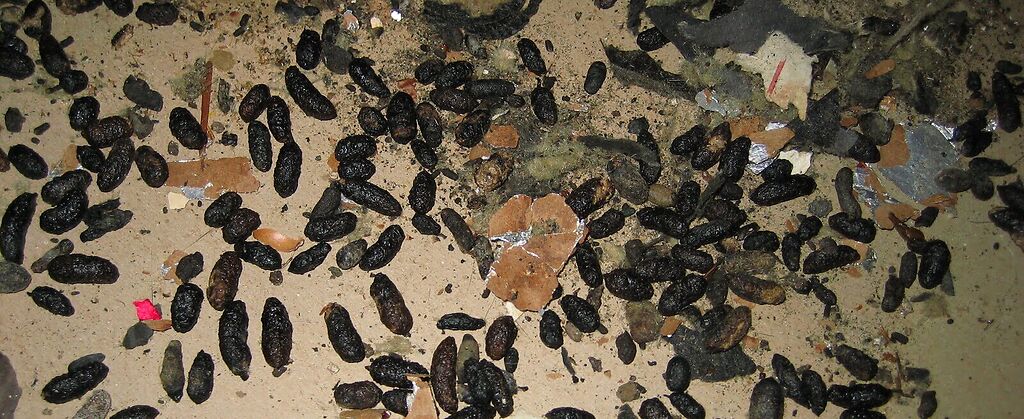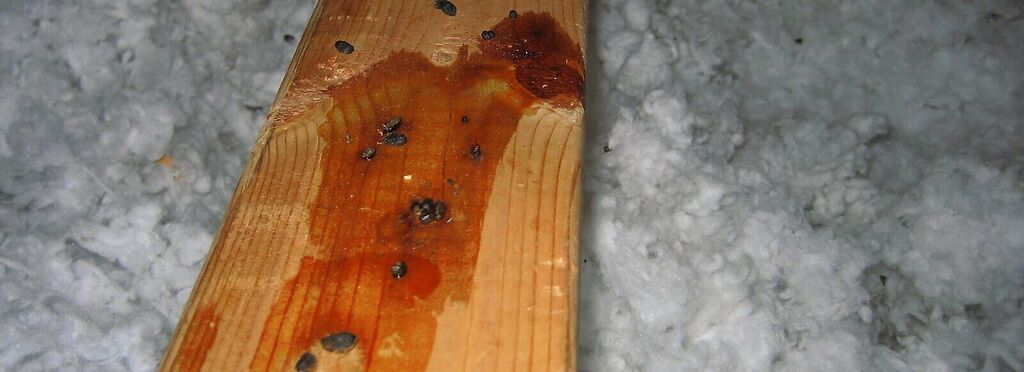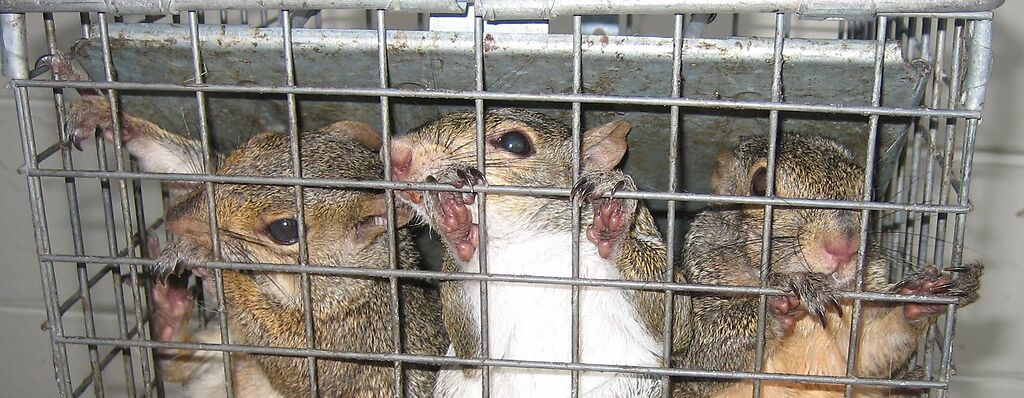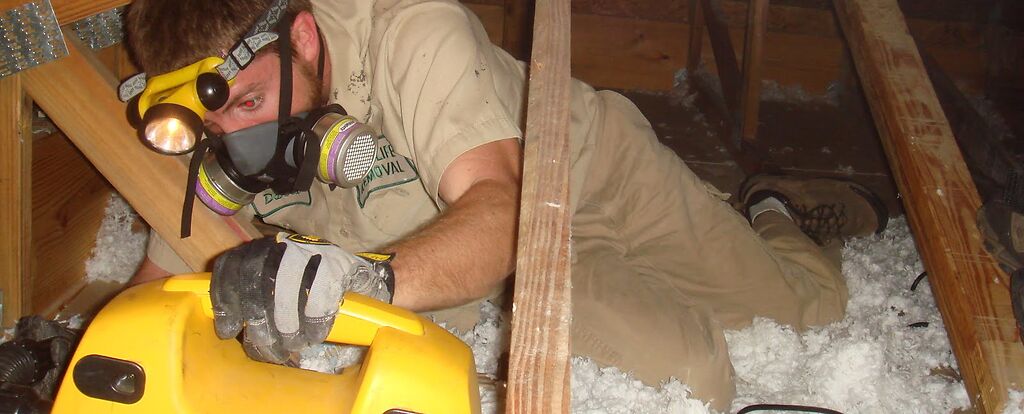What does squirrel poop look like?

Is squirrel feces dangerous to touch or breathe?
There are a number of wild animals who could possibly invade your home that have dangerous poop. Bats are one of them, transmitting the histoplasmosis virus. Even raccoons can be dangerous with the rabies virus soil present in dead and decaying bodies.
With squirrels, there is actually very little threat of disease but that doesn’t mean that you shouldn’t be vigilant. Although the chances of the animal carrying or transmitting the rabies virus is incredibly rare, it’s a threat that can’t be disregarded entirely, and the poop and urine that the animal leaves behind could still prove dangerous to human health.
Why would I come into contact with squirrel feces?
What most homeowners aren’t aware of is the fact that when you have a wild animal sharing your home, it will be doing all the things that wild animals do. It’ll be eating, sleeping, drinking, mating, caring for young babies and more than all of those things - pooping and peeing. Raccoons for example, have latrine areas that basically work as massive toilets. That’s where they’ll do all of their business and when you go to evict them from the attic, cleaning up after the creature is just one part of the job to consider.

Dangers and diseases from squirrel feces
Salmonella is the disease you’ll need to be very careful of when cleaning up squirrel feces - you may have already heard about this nasty medical complaint. After you are infected, usually between 12 and 72 hours later, you’ll start to develop symptoms which could range anywhere from four days to over a week. With symptoms from stomach cramps, diarrhea and vomiting with a fever, chills, aches and more, severe cases can lead to a spell in hospital with dehydration. This isn’t a disease you want to invite into your household, therefore handling the squirrel poop is going to need to be very carefully.
The size of squirrel feces is only marginally bigger than that of a mouse or a rat so when you go to clean it up, using your gloves hands just isn’t really a viable option. Most wild animal removal specialists have special filter vacuums to help do the job - vacuuming up the debris left behind is going to be easier, faster and simpler than trying to pick up each and every pellet as you can probably very well imagine.
Not just worrying about the poop, squirrel feces is a very big concern. Although it might not transmit much in the way of disease, it’s still not good to have lying around the place. Squirrels essentially pee as they run, spreading pheromones all around the place. These pheromones attract other squirrels so if you don’t clean it up with a strong disinfectant, your one squirrel will soon be replaced by many squirrels - a long line of squirrels!
Not just that, any waste matter you leave behind will attract other rodents such as mice and rats. Oh and flies - don’t forget the flies. And what about opossums and raccoons who would happily chow down on a dead squirrel out in the wild? Essentially, by leaving the waste matter behind, you’re inviting into your home an even bigger problem - one that you won’t be able to ignore so easily.

How do I clean squirrel feces out of my attic?
Once you have trapped your squirrel, located and removed the babies, relocated them far enough away so that they can’t find their way back and cause a bigger problem, and then sealed off all entrance / exit points, you should start the cleanup operation with gusto! You’ll need big gloves, a filter vacuum, and preferably some kind of space for a fire in the back yard to burn all the trash and damage that pesky squirrel caused.
Cleaning up after that one squirrel is proving to be a much bigger task than you first thought, right?
You’re going to take an almost military approach to getting rid of the waste material left behind by a rogue squirrel. This tiny creature can cause a serious amount of destruction in its wake and not just that, it can leave a serious amount of waste matter behind too. They spray their urine as they run, leaving scent markings and screaming out to other squirrels and wild animals and not just that, they poop all over the place, leaving the threat of salmonella as well as attracting rats, mice and flies.
Capture and relocate the animalBefore you clean up any squirrel debris you should ensure that you have captured the animal and relocated it safely, relocating and grabbing any babies a female squirrel may have stashed somewhere in your home. Once you have done that, relocating them at least ten to fifteen miles away, it’s time to go around your home ensuring that all gaps, holes, cracks and crevices are sealed and filled so that the squirrel and other animals like it can’t gain access to your home again. Only once you have done that can you then go ahead to clean up and assess the damage left behind by this animal. If you don’t do things in a very specific order, you’re going to be wasting your time. If you clean up after that squirrel only for it to get back in and create another mess three weeks later, you’re going to end up ripping your hair out.
 Ventilate the area
Ventilate the area
Depending on where the squirrel has set up home, you should try to ventilate the area. You don’t know what’s going to be there for a start, and you don’t want to be faced with too many shocking smells.
Disinfect and get rid of poopDonning some extra thick gloves, you’re going to want the strongest, most powerful disinfectant you can get your hands on. A face mask is a great idea too - you don’t want to inhale anything nasty. There’s no such thing as being over-prepared when it comes to wild creatures.
Spray your disinfectant around the area, making sure you cover the entire section of the house the squirrel has invaded. The pheromones left behind in the sprayed urine of these creatures will soon attract more. You will need to be sure you are doing this job as best as you can, being as thorough as you can.
If there’s not too much of the squirrel feces left behind, use a paper towel and your gloved hands to scoop it up, placing it into a bag which you fully intend to burn later. If there is a lot, you might need to look at using a filter vacuum, or hiring in a professional to get the job done for you. You’ve seen how much poop that rats and mice can leave behind, right? Imagine how much a bigger animal could leave behind? And her babies too?
Anything you use that comes into contact with the squirrel debris needs to be either strongly disinfected also, or burnt with the rest of the garbage. There is the threat of salmonella remember. We’ve all had food poisoning at least once in our lifetimes. It’s not pretty.
The areas should be cleaned to the best of your ability. All nesting material should be removed and burned, and this could even mean ripping up huge areas of your attic insulation if that is where the rodent decided to set up home.
You can buy special cleaners that have enzymes in them to help break down the bacteria left behind by wild animals and their urine and feces so it is well worth investing in this before you start. If you can’t get your hands on any, bleach will do the job just as well but just make sure you use plenty of it. Again, there is no such thing as being over-prepared.
 Call the professionals
Call the professionals
If you have a really big problem on your hands, or you just don’t know if this is a job you can take on alone, give the professionals a call. They will have the tools necessary to get this job done, including the filter vacuums and enzyme cleaners.
Wouldn’t you rather this was a job done properly rather than a job done cheaply and potentially give your entire family salmonella?

